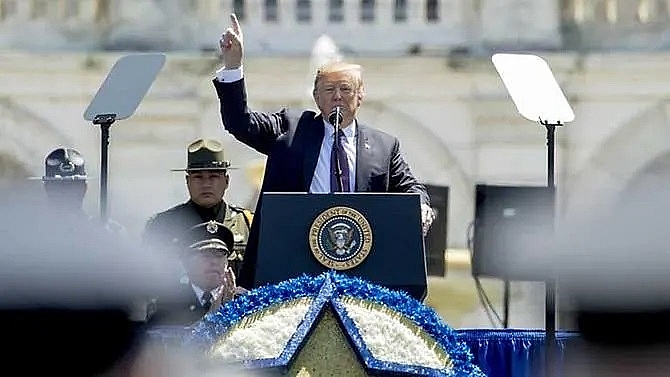Trump declares emergency barring foreign telecoms posing security risk
 |
| President Donald Trump speaks at the 38th Annual National Peace Officers Memorial Service on the West Lawn of the Capitol Building in Washington, DC. (Photo source AP/Andrew Harnik) |
The order signed by Trump prohibits purchase or use of equipment from companies that pose "an unacceptable risk to the national security of the United States or the security and safety of United States persons."
"This administration will do what it takes to keep America safe and prosperous and to protect America from foreign adversaries," White House spokeswoman Sarah Sanders said.
A senior White House official insisted that no particular country or company was targeted in the "company- and country-agnostic" declaration.
However, the measure - announced just as a US-China trade war deepens - is widely seen as prompted by already deep concerns over an alleged spying threat from Huawei.
US officials have been trying to persuade allies not to allow China a role in building next-generation 5G mobile networks, warning that doing so would result in restrictions on sharing of information with the United States.
US government agencies are already banned from buying equipment from Huawei, a rapidly expanding leader in the 5G technology.
China's government is furious.
"For some time, the United States has abused its national power to deliberately discredit and suppress by any means specific Chinese enterprises, which is neither honorable nor fair," foreign ministry spokesman Geng Shuang said.
"We urge the US side to stop the unreasonable suppression of Chinese enterprises on the pretext of national security and to provide a fair and non-discriminatory environment," the spokesman said.
Earlier, David Wang, executive director of Huawei's board, shrugged off news of the upcoming emergency declaration.
"Our business in the US is not very big. We are a company with global operations, so if there is this or that change in any country, the impact on our global business is very little," he said.
TROJAN HORSE CLAIMS
The US portrayal of Huawei as a national security danger dovetails with Washington's wider complaint that Chinese companies are unfairly protected by the state, making fair trade impossible.
On an even broader scale, the United States and some European allies fear that Chinese economic expansion, particularly in the Belt and Road global infrastructure program, is part of a bid for geopolitical dominance.
Amid those worries, Huawei is portrayed as an especially potent Trojan horse that could leverage its ultra-rapid telecoms technology into a Chinese government spy network reaching deep into American society and business fields.
"Chinese telecom companies like Huawei effectively serve as an intelligence-gathering arm of the Chinese Communist Party," Senator Tom Cotton, from Trump's Republican party, said after Trump's emergency declaration.
"The administration is right to restrict the use of their products."
So far, the US campaign to lobby other countries to turn their backs on Huawei has had mixed results.
Even the British government, one of Washington's closest allies, is mired in debate over whether to follow the US lead or allow Huawei's proven expertise in developing the 5G capacities.
On Tuesday, the chairman of the company, Liang Hua, visited London to insist that Huawei will "commit ourselves, to commit our equipment to meeting the no-spy, no back-door standards."
What the stars mean:
★ Poor ★ ★ Promising ★★★ Good ★★★★ Very good ★★★★★ Exceptional
 Tag:
Tag:
Related Contents
Latest News
More News
- Russian President congratulates Vietnamese Party leader during phone talks (January 25, 2026 | 09:58)
- Worldwide congratulations underscore confidence in Vietnam’s 14th Party Congress (January 23, 2026 | 09:02)
- Political parties, organisations, int’l friends send congratulations to 14th National Party Congress (January 22, 2026 | 09:33)
- 14th National Party Congress: Japanese media highlight Vietnam’s growth targets (January 21, 2026 | 09:46)
- 14th National Party Congress: Driving force for Vietnam to continue renewal, innovation, breakthroughs (January 21, 2026 | 09:42)
- Vietnam remains spiritual support for progressive forces: Colombian party leader (January 21, 2026 | 08:00)
- Int'l media provides large coverage of 14th National Party Congress's first working day (January 20, 2026 | 09:09)
- Vietnamese firms win top honours at ASEAN Digital Awards (January 16, 2026 | 16:45)
- ASEAN Digital Ministers' Meeting opens in Hanoi (January 15, 2026 | 15:33)
- ASEAN economies move up the global chip value chain (December 09, 2025 | 13:32)






















 Mobile Version
Mobile Version